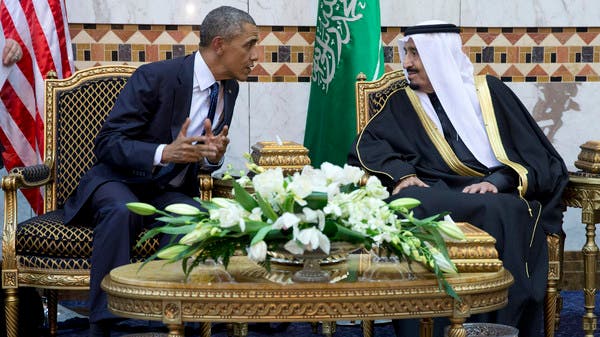BLACKEAGLE
SENIOR MEMBER

President Barack Obama meets with the new Saudi Arabian King Salman bin Abdul Aziz, in Riyadh, Saudi Arabia, Tuesday, Jan. 27, 2015. (AP)
By Joyce Karam | Special to Al Arabiya News
Wednesday, 28 January 2015
It is not every day that 30 U.S. top ranking dignitaries from the opposite side of the political spectrum gather in one place, and it certainly makes headlines when the venue is the Saudi capital, Riyadh. U.S. experts agree that the high-level delegation that President Barack Obama led to the Kingdom to pay respects to the death of King Abdullah bin Abdulaziz emphasizes the deep strategic importance of the bilateral relations and a message “of their endurance” in the future.
The delegation included - besides the U.S. president and the First Lady Michelle Obama - former and current Secretary of States James Baker, Condoleezza Rice and John Kerry, Republican Senator John McCain, National Security Adviser Susan Rice, CIA director John Brennan and other leading U.S. figures from both parties.
Four U.S. administrations
“I am amazed at the depth and breadth of the group,” says John Alterman, senior Vice President and director of the Middle East program at the Center for Strategic and International Studies. The delegation encompasses “four administrations and underscores the loyalties of the past and the enduring future for the U.S.-Saudi relations,” Alterman told Al Arabiya News.
This is the largest delegation that Washington has dispatched to Riyadh and stands out in comparison with the 2005 group that went to pay its condolences following King Fahd bin Abdulaziz’s passing, which included then Vice President Cheney former president George H. W. Bush, and former secretary of state Colin L. Powell.
Andrew Bowen, a Scholar for the Middle East at James A. Baker III Institute for Public Policy, sees the delegation indicatory of “the strategic importance of the U.S.-Saudi relationship and the president's attempt to open a new period of relations with the new King, by bringing with him three statesmen known for their long and strong relations with the Kingdom,” namely Baker, Rice and McCain.
Bowen told Al Arabiya News that Obama’s visit to Riyadh - albeit short in nature - “has been the most positive visit of his presidency.” It attempts to “set the tone at least symbolically of a reset of the relationship and to offer assurances at a time of deep regional turbulence and tensions that he's responsive to Riyadh's concerns.”
The Saudi Royal Court said in a statement that Obama and King Salman discussed Syria, Yemen and Iran, and that the Saudi leadership emphasized the need to resolve the Arab Israeli conflict.
Strategic regional cooperation
The size of the delegation illustrates the level of cooperation that Washington is seeking with Riyadh and sends the message “that the relationship is not going away,” says Alterman. Given the turmoil in the Middle East and mutual interests that both countries have in Yemen, confronting ISIS, and regional security “more agile and robust” cooperation could mark the next phase of Saudi-U.S. relations.
Areas of immediate cooperation and common interests include Yemen and Libya, Bowen added. The expert described the new Saudi team as “very well respected and received in Washington,” noting that “by naming a grandson of Ibn Saud who is well respected in DC, (King) Salman signaled both the future successional stability, but also, a continuity in energy and foreign policies.”
Also the ascendance of Prince Mohammed bin Naif as second-in-line to the throne echoes positively in Washington. Bowen described bin Naif as someone “who has played a key role in leading the kingdom's counterterrorism policies, and managing the Yemen and Syria policy briefs.” He visited Washington in December and met Obama twice in the last year.
A State Department official told Al Arabiya News that the United States “looks forward to continuing our close partnership under the leadership of King Salman, with whom we worked closely over the past years in his former capacities as Crown Prince and Minister of Defense.” Washington has known the new King for more than four decades, and another U.S. official told Al Arabiya News that the relations have seen “major progress in the past eight months”. The official attributed this progress to Saudi’s role “in bringing the Gulf Cooperation Council together and engaging as a “key partner in the fight against ISIS.”
This progress and vast regional cooperation between Riyadh and Washington has prompted assembling the delegation today, which emphasizes the continuity in the relations beyond the changing regional headlines, and partisan battles inside Washington.
_________
Joyce Karam is the Washington Correspondent for Al-Hayat Newspaper, an International Arabic Daily based in London. She has covered American politics extensively since 2004 with focus on U.S. policy towards the Middle East. Prior to that, she worked as a Journalist in Lebanon, covering the Post-war situation. Joyce holds a B.A. in Journalism and an M.A. in International Peace and Conflict Resolution. Twitter: @Joyce_Karam
Last Update: Wednesday, 28 January 2015 KSA 02:14 - GMT 23:14
http://english.alarabiya.net/en/per...g-loyalties-of-past-and-enduring-future-.html
